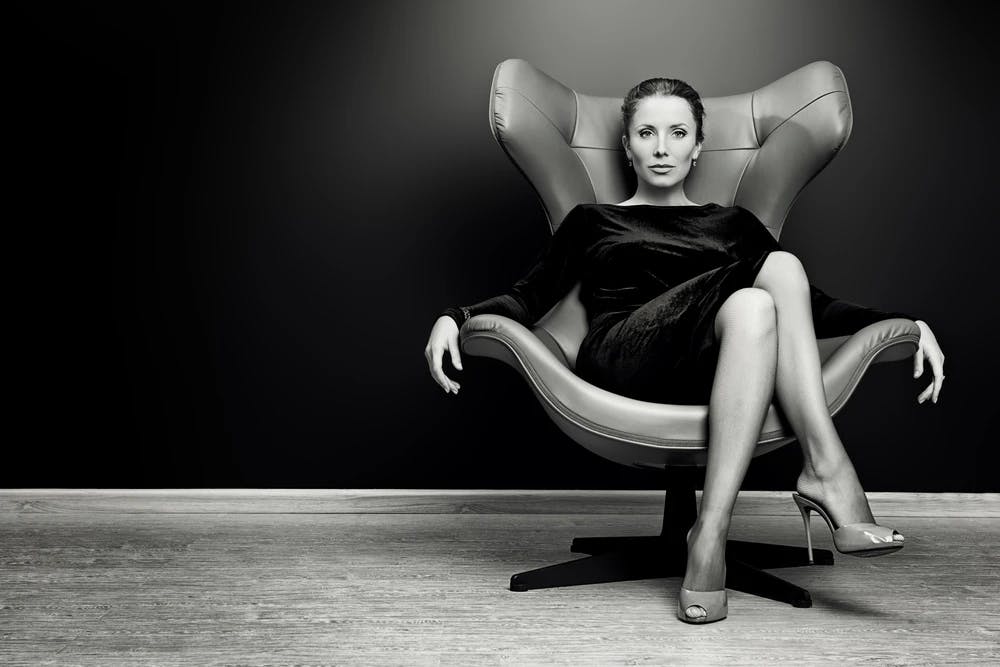The Not-So-Empowering Lies Women Have Been Sold About Happiness
Happiness for each of us may look different than what society and women's media currently tells us it should.

By almost every social, political, and economic metric, women in Western nations currently enjoy an unprecedented amount of freedom and equality. The past century's fights over suffrage, equal access to education, and acceptance in the workplace have, thankfully, allowed women to take control over their destinies in ways that would have been impossible for previous generations. And yet, despite these gains for women's rights, it doesn't seem like any of that progress has made us happier. In fact, if the numbers are to be believed, it's actually the opposite: women are more unhappy now than ever.
Despite these gains for women's rights, it doesn't seem like any of that progress has made us happier.
The Profile of the Most Unhappy Person
Depression rates are growing steadily in the developed world, with women consistently exhibiting greater rates than men. And similarly, the self-reported happiness of females has been on the decline since the 1970s. In fact, one 2011 study of the American workforce found that the "profile" of the most unhappy person was a 42-year-old woman who was unmarried, had no children, and was a professional (doctor, lawyer, etc.). Considering that this profile is not only more and more common, but also something that our culture assures should allow us to be perfectly happy, I think it's fair to wonder what's going on. Why exactly is it that so many of us are unhappy? And just as importantly, what can we do about it?
The "profile" of the most unhappy person was a 42-year old woman who was unmarried, had no children, and was a professional.

Relationships Are in Decay
Whether it's for better or worse, no one can discount the role that relationships play in affecting our overall well-being. And while the stereotype of the grumbling husband and unfulfilled wife is one that popular culture loves to attribute to married couples, research has actually found that married people tend to be happier than singles, not just during newlywed bliss, but at every stage of their lives.
Granted, this data alone doesn't tell us whether marriage is what makes people happy or if happy people are just more likely to get married. But in either case, it's an important trend, considering that the number of adults who have never been married has been increasing since the 1970s and is currently at an all-time high. If marriage is indeed tied to happiness, perhaps it's not such a good thing that we, as a culture and as individuals, continue to push it aside.
Married people tend to be happier than singles, not just during newlywed bliss, but at every stage of their lives.
And what leaves the romantic lives of women in an even more precarious state, is that while the stability of marriage has been on the decline, hook-up culture, which promotes casual sex outside of long-term relationships, has conversely become normalized. Although no-strings-attached encounters might seem satisfying at the moment, the long-term effects that are so rarely mentioned in the glossy pages of women's magazines can include depression, low self-esteem, and loneliness.
And while I, of course, believe that women should make their own decisions when it comes to their love lives, I can't help but feel that many women might choose differently if they were aware of how their well-being could be negatively impacted.
It's All about "Me"
Another part of our lives that may be contributing to rates of unhappiness is - unfortunately, but not surprisingly - our frequent use of social media. Social media marketing firms have estimated people spend just under two hours every day between different platforms like YouTube, Facebook, and Instagram. And while the pull of social media is usually something benign, like catching up with the cutest dog photos or seeing what our friends, families, and favorite celebrities are up to, research now suggests that there's a darker underside to the constant chase for likes.

It's been noted that frequent exposure to social media is harmful to women's self-esteem, as one study found that women who spent more time on social media were more likely to report having a negative body image. When faced with a constant barrage of Instagram models who are filtered and photoshopped to perfection, it's sadly understandable that women might feel like they don't measure up. And this is especially true for young, teenage girls; among 14-15 year-olds, a mere 33% of them reported feeling good about themselves, down from 41% in 2007.
Frequent exposure to social media is harmful to women's self-esteem
Additionally, the concept of self-promotion that much of the popularity on social media depends upon has, quite predictably, contributed to an increasingly narcissistic society. And though confidence is generally a good thing, "self-love" to the point of narcissism is tied to depression and, quite paradoxically, low self-esteem. In a surprising example of this, just a few years ago, previously well-known influencer Essena O'Neill famously deleted her Instagram after describing the platform as "contrived perfection made to get attention." Social media may not be evil since many people are perfectly happy being casual users, but at the very least, an obsession with it is without a doubt unhealthy.
Work Isn't Making Us Happy
But looking at all the ways that our personal lives might be chaotic, women can at least take solace in the comfort that the professional world offers, right? Well, not really. Although women on average work fewer hours than men, they are statistically more likely to report work-related stress, anxiety, or depression. And when working more than 40 hours a week, women are also less likely than men to report that they're satisfied with their work-life balance.
Although women on average work fewer hours than men, they are more likely to report work-related stress, anxiety, or depression.
As women, we are so often told to reach for the heights of success in the corporate world to prove that we can do it and that we're just as hard-working and business-savvy as men. But looking at these statistics, it may be necessary for each of us to consider whether sacrificing our mental health and work-life balance is actually a price we're willing to pay to have a padded-out resume. And, as much as external factors in our lives might be increasing our likelihood of depression, that's not even to mention how the medication we take is potentially affecting us. If you're taking birth control or antidepressants, those seemingly harmless drugs might actually be the cause of your depression.
What Can We Do?
So when looking at the list of things which seem to chip away at our happiness, it'd be easy to believe that, in many ways, our society is actually working against our well-being. And while it's true that it's perhaps easier than ever to fall into a pattern of culturally-condoned, self-destructive behavior, understanding the pitfalls in our lives is the first step toward avoiding them. Specifically, while previous generations of women had institutional barriers to overcome, it seems like many of the detrimental aspects of our well-being nowadays relate to our own choices in life.
Understanding the pitfalls in our lives is the first step toward avoiding them.
Right now there are an almost endless number of different lifestyle options available to us regarding our relationships, social lives, and careers, and for so long it seems like we've been fighting for the right to say, "Yes, I can do this!" that along the way, we forgot to ask ourselves whether we should do those things. We're free to pursue (as we should be!) romance or independence, thousands of likes, or a high-pressure job, but each of those choices come with consequences.